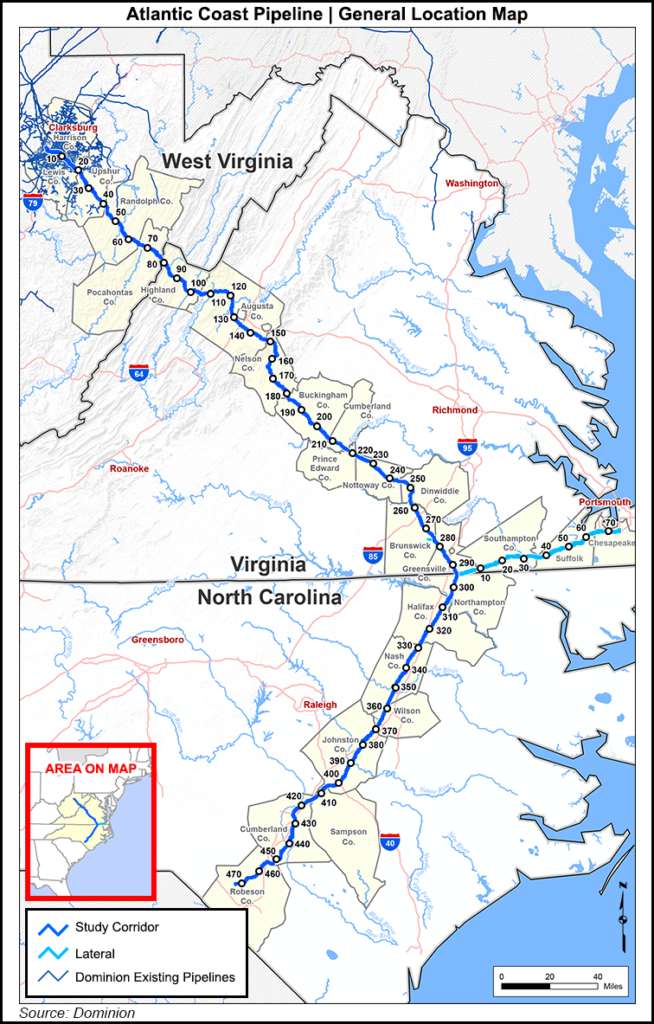Infrastructure | NGI All News Access | NGI The Weekly Gas Market Report
Dominion Taking Partners to Build Natural Gas System From West Virginia Into North Carolina
Dominion is partnering with Duke Energy, Piedmont Natural Gas and AGL Resources to build the Atlantic Coast Pipeline, a 1.5 Bcf/d, 550-mile natural gas system that would move Appalachian Basin gas from West Virginia to North Carolina.

The joint venture, Atlantic Coast Pipeline LLC, would build and own the proposed pipeline, expected to be in service as soon as 2018, at a cost up to $5 billion. The project replaces Dominion’s Southeast Reliability Project (SRP), proposed in May (see Daily GPI, May 28).
As envisioned, Atlantic Coast would begin as a 42-inch diameter pipeline traversing Harrison County, WV, and moving southeast through Virginia, with a 20-inch diameter extension to Chesapeake, VA. A 36-inch diameter pipe would carry gas through Central North Carolina to Robeson County.
Three compressor stations are planned, one in Harrison County, another in Buckingham County, VA, and one near the Virginia-North Carolina state line. The range of normal operating pressure on the pipeline would be from 750 pounds per square inch gauge (psig) to 1,440 psig. The pipeline would be designed with redundant safety systems to ensure maximum pressure is not exceeded.
The new pipeline in part is designed to meet the needs identified in a request for proposal (RFP) last April by Duke and Piedmont (see Daily GPI, April 1). Virginia Power Services Energy also issued a RFP in June to secure more gas supplies.
Dominion CEO Tom Farrell, with the other partner CEOs — Duke’s Lynn Good, Piedmont’s Thomas Skains and AGL chief John Somerhalder II — said the pipeline would be transformational, creating thousands of construction jobs during development and new revenue for state and local governments.
“The expanded source of gas will also help fuel economic development across the region as businesses and homes rely more on natural gas,” they said. “The project will also provide more reliable access to new sources of natural gas, keeping consumers’ energy costs down — even during the coldest and hottest weather.”
Dominion, which would own 45% of the partnership, is to build and operate the pipeline on behalf of the venture. Duke would have a 40% stake, while Piedmont’s is 10% and AGL’s 5%. Subsidiaries and affiliates of all the partners, as well as PSNC Energy, would be 20-year contract customers, pending regulatory approvals.
Dominion has notified landowners along a 400-wide study corridor; preliminary work and route planning have been underway since SRP was proposed.
A pre-filing request with the Federal Energy Regulatory Commission is expected this fall, with an application possible in the summer of 2015. If all goes to plan, a certificate of public convenience and necessity could be received by mid-2016 to allow construction to begin, Dominion said.
North Carolina now is served primarily by a single, wholesale interstate gas pipeline that runs through the western portion of the state, Dominion said. Virginia also has “limited access to supplies” from the Appalachian Basin “and has a need for increased infrastructure to support growing demand for natural gas-fired generation, and to add supply diversity for reliability and price stability.”
© 2024 Natural Gas Intelligence. All rights reserved.
ISSN © 1532-1231 | ISSN © 2577-9877 | ISSN © 1532-1266 |
